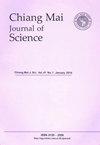用变性梯度凝胶电泳研究根际细菌接种剂和有机改进剂对菊芋组织和根际细菌群落的影响
IF 0.8
4区 综合性期刊
Q3 MULTIDISCIPLINARY SCIENCES
引用次数: 0
摘要
施用有机改良剂可以改善土壤质量,影响细菌群落,有助于提高农业系统的土壤健康。以雨树叶、玉米皮和泥炭苔藓为土壤改良剂,添加促生根瘤菌对菊芋组织和根际细菌群落的影响。移栽后观察植株120 d。采用聚合酶链反应-变性梯度凝胶电泳(DGGE)技术研究了有机改性和细菌群的影响。通过聚类分析比较DGGE图谱并不能明确区分各有机改良剂和细菌接种,但主成分分析(PCA)表明,植物年龄对组织和根际细菌群落有影响。结果表明,土壤改良剂和细菌接种对细菌群落的迁移没有影响。有趣的是,能够在组织和根际中定植最多的细菌属是未培养的细菌。因此,我们为促进菊芋生长和土壤质量提供了有希望的数据,潜在的有机改良剂可以通过可持续的策略改善土壤。本文章由计算机程序翻译,如有差异,请以英文原文为准。
Impact of Rhizobacterial Inoculants and Organic Amendment on Bacterial Communities of Jerusalem artichoke Tissue and Rhizosphere by using Denaturing Gradient Gel Electrophoresis
The application of organic amendments can improve soil quality and influence bacterial communities, contributing to enhanced soil health in agricultural systems. This study investigated the effect of using rain tree leaf, corn husk, and peat moss as soil amendments, supplemented with plant growth promoting rhizobacteria on communities of bacteria in the tissue and rhizosphere of Jerusalem artichoke. The plants were observed for 120 days after transplanting. Polymerase chain reaction-denaturing gradient gel electrophoresis (DGGE) technique was used to investigate the impact of both organic amendments and bacterial consortium with comparative profiles. Comparison DGGE profile by clustering analysis did not clearly separate each organic amendment and bacterial inoculation, but principal component analysis (PCA) revealed that plant age had an influence on tissue and rhizosphere bacterial communities. The results indicated that soil amendments and bacterial inoculation had no effect on bacterial community shifts. Interestingly, the genera of bacteria able to most colonize in the tissue and rhizosphere were the uncultured bacteria. Thus, we provide promising data for boosting Jerusalem artichoke growth and soil quality with potential organic amendments to improve soil with sustainable strategies.
求助全文
通过发布文献求助,成功后即可免费获取论文全文。
去求助
来源期刊

Chiang Mai Journal of Science
MULTIDISCIPLINARY SCIENCES-
CiteScore
1.00
自引率
25.00%
发文量
103
审稿时长
3 months
期刊介绍:
The Chiang Mai Journal of Science is an international English language peer-reviewed journal which is published in open access electronic format 6 times a year in January, March, May, July, September and November by the Faculty of Science, Chiang Mai University. Manuscripts in most areas of science are welcomed except in areas such as agriculture, engineering and medical science which are outside the scope of the Journal. Currently, we focus on manuscripts in biology, chemistry, physics, materials science and environmental science. Papers in mathematics statistics and computer science are also included but should be of an applied nature rather than purely theoretical. Manuscripts describing experiments on humans or animals are required to provide proof that all experiments have been carried out according to the ethical regulations of the respective institutional and/or governmental authorities and this should be clearly stated in the manuscript itself. The Editor reserves the right to reject manuscripts that fail to do so.
 求助内容:
求助内容: 应助结果提醒方式:
应助结果提醒方式:


